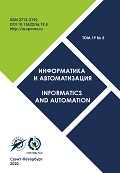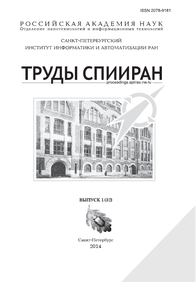Использование темпоральных характеристик для сегментации речевого потока на крупные смысловые единицы (на материале русского языка)
Ключевые слова:
темпоральный контур, длительность гласных, членение речевого потока, предпаузальное удлинениеАннотация
Настоящая работа посвящена исследованию темпоральных характеристик гласных в словах, расположенных на концах крупных смысловых единиц — синтагм и фраз. Исследование выполняется на материале корпуса CORPRES, содержащего записи чтения текстов профессиональными дикторами; общее время звучания проанализированного материала составляет около 12 часов. Результаты анализа значений нормализованной длительности гласных показали, что в словах, расположенных на конце синтагмы или фразы, удлиняется ударный гласный, а также заударный, если он находится в абсолютном конце слова; это верно даже в тех случаях, когда фразовое ударение реализуется не на последнем слове синтагмы. На степень удлинения влияет наличие последующей паузы, «глубина» границы, наличие фразового ударения на последнем слове синтагмы и тип интонационного контура. Кроме того, описаны особенности темпорального оформления незавершенности по типу ИК-3 и логического ударения по типу ИК-2 в позиции перед границей синтагмы.Литература
1. Wightman C.W., et. al. Segmental durations in the vicinity of prosodic phrase boundaries // J. Acoust. Soc. Am. 1992. vol. 91. № 3. pp. 1707–1717.
2. Choi J.-Y., Hasegawa-Johnson M., Cole J. Finding intonational boundaries using acoustic cues related to the voice source // J. Acoust. Soc. Am. 2005. vol. 118. № 4. pp. 2579–2587.
3. Streeter L.A. Acoustic determinants of phrase boundary perception // J. Acoust. Soc. Am. 1978. vol. 64. № 6. pp. 1582–1592.
4. Bartkova K. Rhythmic patterns and their automatic retrieval in spontaneous French // Proceedings of the Speech Prosody 2008 Conference, 2008. pp. 351–354.
5. Campbell W.N. Evidence for a Syllable-Based Model of Speech Timing // Proceedings of the International Conference on Spoken Language Processing. 1990. pp. 9–12.
6. Cooper W.E., Danly M. Segmental and Temporal Aspects of Utterance-Final Lengthening // Phonetica. 1981. vol. 38. № 1-3. pp. 106–115.
7. Horne M., Strangert E., Heldner M. Prosodic Boundary Strength In Swedish: Final Lengthening And Silent Interval Duration // Proceedings of the XIIIth International Congress of Phonetic Sciences. Stockholm: Congress organisers at KTH and Stockholm University, 1995. pp. 170–173.
8. Lehiste I., Olive J.P., Streeter L.A. Role of duration in disambiguating syntactically ambiguous sentences // J. Acoust. Soc. Am. 1976. vol. 60. № 5. pp. 1199–1202.
9. Ostendorf M., et. al. The Use of Relative Duration in Syntactic Disambiguation // Proceedings of the Workshop on Speech and Natural Language HLT ’90. Stroudsburg, PA, USA: Association for Computational Linguistics, 1990. pp. 26–31.
10. Pijper J.R. de, Sanderman A.A. On the perceptual strength of prosodic boundaries and its relation to suprasegmental cues // J. Acoust. Soc. Am. 1994. vol. 96. № 4. pp. 2037 – 2047.
11. Price P.J., Ostendorf M., Wightman C.W. Prosody and Parsing // Proceedings of the Workshop on Speech and Natural Language HLT ’89. Stroudsburg, PA, USA: Association for Computational Linguistics, 1989. pp. 5–11.
12. Skrelin P.A., et. al. A Fully Annotated Corpus of Russian Speech // Proceedings of the Seventh conference on International Language Resources and Evaluation (LREC’10). : European Language Resources Association (ELRA), 2010. pp. 109 – 112.
13. Vaissière J. Language-Independent Prosodic Features // Prosody: Models and Measurements Springer Series in Language and Communication. / edited by. D.A. Cutler, D.D.R. Ladd.: Springer Berlin Heidelberg, 1983. pp. 53–66.
14. Volskaya N.B., Skrelin P.A. Prosodic model for Russian // Proceedings of Nordic Prosody X. Helsinki: Frankfurt am Main: Peter Lang, 2009. pp. 249–260.
15. Вольская Н.Б., Степанова С.Б. Предпаузальное удлинение в русском языке // Эксприментально-фонетический анализ речи: проблемы и методы. Фонетическое многообразие языков мира. СПб., 2004. Вып. 5. С. 48–55.
16. Кривнова О.Ф. Глоттализация на границах фонетических составляющих в женской речи (на русском материале) // Проблемы и методы экспериментально-фонетических исследований. СПб., 2002. С. 165–189.
17. Кривнова О.Ф. Ритмизация и интонационное членение текста в «процессе речи-мысли»: опыт теоретико-экспериментального исследования. Диссертация на соискание ученой степени доктора филологических наук. // М., 2007. 347 с.
2. Choi J.-Y., Hasegawa-Johnson M., Cole J. Finding intonational boundaries using acoustic cues related to the voice source // J. Acoust. Soc. Am. 2005. vol. 118. № 4. pp. 2579–2587.
3. Streeter L.A. Acoustic determinants of phrase boundary perception // J. Acoust. Soc. Am. 1978. vol. 64. № 6. pp. 1582–1592.
4. Bartkova K. Rhythmic patterns and their automatic retrieval in spontaneous French // Proceedings of the Speech Prosody 2008 Conference, 2008. pp. 351–354.
5. Campbell W.N. Evidence for a Syllable-Based Model of Speech Timing // Proceedings of the International Conference on Spoken Language Processing. 1990. pp. 9–12.
6. Cooper W.E., Danly M. Segmental and Temporal Aspects of Utterance-Final Lengthening // Phonetica. 1981. vol. 38. № 1-3. pp. 106–115.
7. Horne M., Strangert E., Heldner M. Prosodic Boundary Strength In Swedish: Final Lengthening And Silent Interval Duration // Proceedings of the XIIIth International Congress of Phonetic Sciences. Stockholm: Congress organisers at KTH and Stockholm University, 1995. pp. 170–173.
8. Lehiste I., Olive J.P., Streeter L.A. Role of duration in disambiguating syntactically ambiguous sentences // J. Acoust. Soc. Am. 1976. vol. 60. № 5. pp. 1199–1202.
9. Ostendorf M., et. al. The Use of Relative Duration in Syntactic Disambiguation // Proceedings of the Workshop on Speech and Natural Language HLT ’90. Stroudsburg, PA, USA: Association for Computational Linguistics, 1990. pp. 26–31.
10. Pijper J.R. de, Sanderman A.A. On the perceptual strength of prosodic boundaries and its relation to suprasegmental cues // J. Acoust. Soc. Am. 1994. vol. 96. № 4. pp. 2037 – 2047.
11. Price P.J., Ostendorf M., Wightman C.W. Prosody and Parsing // Proceedings of the Workshop on Speech and Natural Language HLT ’89. Stroudsburg, PA, USA: Association for Computational Linguistics, 1989. pp. 5–11.
12. Skrelin P.A., et. al. A Fully Annotated Corpus of Russian Speech // Proceedings of the Seventh conference on International Language Resources and Evaluation (LREC’10). : European Language Resources Association (ELRA), 2010. pp. 109 – 112.
13. Vaissière J. Language-Independent Prosodic Features // Prosody: Models and Measurements Springer Series in Language and Communication. / edited by. D.A. Cutler, D.D.R. Ladd.: Springer Berlin Heidelberg, 1983. pp. 53–66.
14. Volskaya N.B., Skrelin P.A. Prosodic model for Russian // Proceedings of Nordic Prosody X. Helsinki: Frankfurt am Main: Peter Lang, 2009. pp. 249–260.
15. Вольская Н.Б., Степанова С.Б. Предпаузальное удлинение в русском языке // Эксприментально-фонетический анализ речи: проблемы и методы. Фонетическое многообразие языков мира. СПб., 2004. Вып. 5. С. 48–55.
16. Кривнова О.Ф. Глоттализация на границах фонетических составляющих в женской речи (на русском материале) // Проблемы и методы экспериментально-фонетических исследований. СПб., 2002. С. 165–189.
17. Кривнова О.Ф. Ритмизация и интонационное членение текста в «процессе речи-мысли»: опыт теоретико-экспериментального исследования. Диссертация на соискание ученой степени доктора филологических наук. // М., 2007. 347 с.
Опубликован
2014-04-09
Как цитировать
Качковская, Т. В. (2014). Использование темпоральных характеристик для сегментации речевого потока на крупные смысловые единицы (на материале русского языка). Труды СПИИРАН, 1(32), 68-81. https://doi.org/10.15622/sp.32.5
Раздел
Статьи
Авторы, которые публикуются в данном журнале, соглашаются со следующими условиями:
Авторы сохраняют за собой авторские права на работу и передают журналу право первой публикации вместе с работой, одновременно лицензируя ее на условиях Creative Commons Attribution License, которая позволяет другим распространять данную работу с обязательным указанием авторства данной работы и ссылкой на оригинальную публикацию в этом журнале.
Авторы сохраняют право заключать отдельные, дополнительные контрактные соглашения на неэксклюзивное распространение версии работы, опубликованной этим журналом (например, разместить ее в университетском хранилище или опубликовать ее в книге), со ссылкой на оригинальную публикацию в этом журнале.
Авторам разрешается размещать их работу в сети Интернет (например, в университетском хранилище или на их персональном веб-сайте) до и во время процесса рассмотрения ее данным журналом, так как это может привести к продуктивному обсуждению, а также к большему количеству ссылок на данную опубликованную работу (Смотри The Effect of Open Access).







